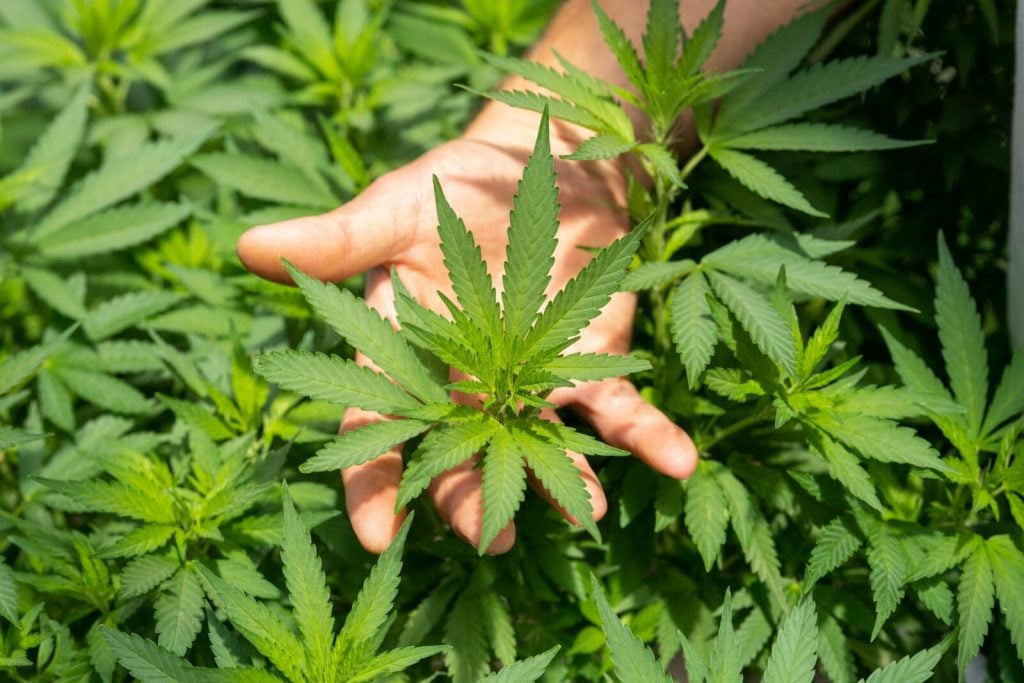Treating Insomnia with Hemp: A Closer Look

Table of Contents
- Insomnia As A Whole
- Hemp as a Treatment for Insomnia
- Comparing Hemp with Other Insomnia Treatments
- Legal and Ethical Considerations
- Patient Experiences and Case Studies
- Understanding the Basics of Hemp
- Hemp's Influence on Sleep
- Medical Usage of Hemp
- Limitations and Gaps in Current Research
- Best Place To Shop For Cannabis Products?
- Future Research and Perspectives
Welcome to our comprehensive guide on Hemp as a potential treatment for insomnia. This article will cover everything from the fundamental understanding of insomnia, its causes, and traditional therapies to everything you need to know about Hemp. We will explore how Hemp affects the body and its other medical uses. Primarily, we will focus on the potential use of Hemp in treating insomnia - the current research, methodology, and possible side effects. We'll compare other insomnia treatments, present patient experiences and case studies, and discuss the legal and ethical ramifications.
Finally, we will provide a preview of future research and perspectives of various experts on this burgeoning area. Insomnia is a sleep disorder marked by difficulty falling asleep, staying asleep, or both. It leads to daytime sleepiness, energy loss, mood swings, and decreased performance at work or school. People suffering from this disorder may also experience difficulties with concentration and memory. According to medical professionals, insomnia is categorized as chronic if difficulties with sleep persist three nights or more each week for at least three months.
READ: Does CBD Oil Tincture Get Me High?
Insomnia As A Whole

Several factors contribute to insomnia. These can be broadly classified into medical, psychological, or lifestyle factors. Insomnia causes include asthma, arthritis, chronic pain, endocrine problems like hyperthyroidism, gastrointestinal problems like acid reflux, neurological conditions like Parkinson's disease, and sleep apnea. Prescription drugs used to treat these conditions can also lead to insomnia.
Psychological factors often constitute stress, anxiety, and depression. Other psychological illnesses, such as bipolar disorder or schizophrenia, are also linked to insomnia. People suffering from such mental health disorders often have erratic sleeping patterns, exacerbating their inability to find proper sleep.
Lastly, lifestyle factors are significant contributors. Some people have jobs that disrupt their normal sleep cycle, like night shifts, early morning shifts, and jobs requiring long work hours or frequent travel. Such irregular schedules can confuse the body's internal clock, leading to difficulties falling asleep. Other lifestyle choices, such as excessive consumption of caffeine or alcohol, poor sleep hygiene, and poor nutrition, can also result in insomnia.
The traditional treatments for insomnia involve a combination of medicines and behavioral techniques. Pharmacological therapies include hypnotics, sedatives, and some types of antidepressants. However, monitoring these medications closely is essential because of their potential for addiction and withdrawal symptoms.
In contrast, non-pharmacological or behavioral techniques address the problem's root cause. They include sleep hygiene education, cognitive-behavioral therapy (CBT), relaxation techniques, and stimulus control therapy. Sleep hygiene education involves teaching the patient about healthy habits that promote good sleep. In contrast, CBT works by helping the patient break the association of certain activities or thoughts with sleep. Relaxation techniques involve systematic muscle relaxation, deep breathing exercises, and meditation, all of which can help induce sleep. Stimulus control therapy helps people associate the bed with sleep rather than activities like reading or watching TV.
Overall, understanding insomnia, including its causes and treatments, is vital as it affects many aspects of a person's life, from physical health to performance at work or school. Medical, psychological, and lifestyle factors can all lead to insomnia, but combining medications and behavioral techniques can help treat the condition. It's crucial for those suffering from insomnia to seek professional help to manage this condition better and restore quality sleep.
What is Hemp?
Hemp is a versatile plant used for centuries in various ways. It is a member of the Cannabis sativa family and is related to marijuana and industrial hemp. Hemp is one of the oldest cultivated plants for food, textiles, medicine, and more. This article will discuss what hemp is, its history, its uses, and its health benefits.
History of Hemp
Hemp has a long and varied history. Its use dates back thousands of years to Neolithic times, when it was used for food, textiles, and medicine. Hemp was an essential crop in Europe during the Middle Ages when it produced rope, paper, and sailcloth. In the 16th century, hemp was introduced to North America, where it was used for various purposes, including producing paper, clothing, and fuel.
How Hemp Affects the Brain and Body
Hemp interacts with the body's endocannabinoid system, a complex cell-signaling system that plays several roles in maintaining homeostasis or stability in various physiological functions. It attaches to the cannabinoid receptors, particularly CB1 receptors in the brain, altering everyday brain communication and causing euphoria or 'high.'
The psychoactive effect is usually followed by an alteration in mood, perception, and cognition, including a sense of euphoria, enhanced sensory perception, and other mood changes. Also, Hemp can lead to impaired thinking and problem-solving ability alongside disrupted coordination and memory. Physical impacts include increased heart rate, dry mouth, red eyes, and slower reaction times.
Other Medicinal Uses of Hemp
Besides its recreational use, Hemp has been diverted into various therapeutic avenues. Its similarity to the body's natural endocannabinoids gives it some medicinal properties. For instance, Hemp can act as an analgesic to help reduce pain and inflammation. It is currently used in medications for multiple sclerosis and AIDS-related weight loss.
Research on Hemp has revealed its potential therapeutic use in treating conditions such as epilepsy, PTSD, and even cancer. It has often been used to induce relaxation, stimulate appetite, and reduce nausea, particularly in chemotherapy patients. Also, Hemp has shown promising results in helping reduce intraocular pressure in glaucoma patients, potentially serving as a new line of therapy. However, considering its psychoactive effects, further research is needed to consolidate Hemp's therapeutic efficacy and safety.
Hemp as a Treatment for Insomnia

Insomnia, a prevalent sleep disorder that can create difficulties in falling asleep or maintaining sleep throughout the night, is suffered by millions globally. Traditional methods for treating insomnia often involve pharmaceutical drugs that can cause unwanted side effects and may lose their effectiveness over time due to built-up tolerance. As a result, more people are exploring alternative treatment methods, including tetrahydrocannabinol (Hemp), an active compound found in cannabis.
Research on the Effectiveness of Hemp for Insomnia
Scientific studies on the effectiveness of Hemp for the treatment of insomnia have generated promising results. According to a study published in the Journal of Clinical Psychopharmacology, patients who received a 2.5-5mg dose of Hemp reported significant improvements in their quality and duration of sleep. Other studies have found similar results, with subjects showing decreased sleep latency and fewer nighttime awakenings after consumption of Hemp.
Though more research is needed due to the restrictions on cannabis studies historically, these preliminary studies suggest that Hemp can be an effective alternative treatment for those suffering from insomnia.
READ: Does THCa Concentrate Get Me High?
How Hemp Treats Insomnia
Hemp treats insomnia by interacting with the endocannabinoid system in the body. This system regulates various physical and mental processes, including the sleep-wake cycle. When consumed, Hemp binds to receptors in the central nervous system, helping to promote a sense of calm and relaxation. This can help those suffering from insomnia to fall asleep quicker and maintain sleep throughout the night.
Additionally, Hemp is a known sedative and can induce feelings of drowsiness, which can be particularly beneficial for those who struggle with insomnia. By promoting a relaxed physical and mental state, Hemp may help curtail the anxiety and stress that often contribute to sleep disturbances.
Side Effects of Using Hemp for Insomnia
While using Hemp may prove effective in treating insomnia for some individuals, it is also essential to consider the potential side effects. Like other medications, Hemp can cause adverse reactions, such as dry mouth, bloodshot eyes, increased heart rate, and changes in appetite. In some cases, individuals may experience paranoia or anxiety, though these side effects are usually associated with higher doses of Hemp.
Furthermore, as with other sleep aids, there is a potential for a person to develop a tolerance to Hemp over time. This can lead to needing larger doses to achieve the same effect, potentially increasing the risk of experiencing adverse side effects.
Lastly, as with any medication, it is recommended that individuals considering Hemp as a treatment for insomnia consult with a qualified healHempare professional. They can provide individualized advice considering the person’s medical history, current health condition, and potential interactions with other medications.
Comparing Hemp with Other Insomnia Treatments
Millions worldwide suffer from chronic insomnia, and the quest for a definitive cure or effective treatment often proves elusive. Tetrahydrocannabinol, commonly known as Hemp, has been gaining increasing attention as an alternative treatment for insomnia. As the psychoactive ingredient in cannabis, Hemp has a range of effects that can potentially aid in inducing sleep. This article section will inform you about how this substance compares with traditional sleep medications, considering factors like efficiency, side effects, and risks.
Efficiency of Hemp Versus Traditional Insomnia Medications
The most commonly used substances for insomnia are benzodiazepines and non-benzodiazepine sedatives. These substances work effectively for many, but not for everyone. Furthermore, because they can be habit-forming and often lead to drowsiness the following day, many people are beginning to explore alternatives such as Hemp.
The evidence suggests that Hemp may be a potentially viable substitute. While Hemp doesn't force sleep like many traditional medications, it can have a soothing effect that encourages sleep. For some people, Hemp also reduces stress and anxiety, which are common causes of insomnia. Moreover, Hemp is used to treat chronic pain and post-traumatic stress disorder, which often accompany and exacerbate sleep problems.
Hemp gives mixed results in efficiency compared to traditional treatments. Some users experience a significant improvement in sleep length and quality, while others do not achieve the desired outcomes. The variability of effects could be explained by differences in individuals' physiological responses to Hemp, the insomnia's underlying cause, or the quantity and method of administration of Hemp.
Risks and Side Effects: Hemp Versus Traditional Medications
Like any sleep aid, Hemp is not without its potential downsides. Excessive use of Hemp can lead to habituation and dependence, mirroring the risks associated with traditional insomnia medications. Moreover, using Hemp can have side effects such as dry mouth, increased appetite, and transient impairments of memory and coordination.
However, Hemp presents different risks and side effects compared to traditional insomnia medications. Many traditional sleep aids can produce deep sedation, which, while beneficial for sleep, can result in drowsiness and decreased cognitive function the next day. There is also the risk of overdose with these medications, which is not a concern with Hemp.
Nonetheless, it is crucial to consult a medical professional before starting any new treatment for insomnia. With all the potential benefits, it's also worth understanding that Hemp can interact with other medications and pre-existing medical conditions. Proper medical advice can help you find the safest treatment option.
While Hemp can't be universally prescribed as an insomnia treatment, the evidence thus far makes it worth considering. As with any medication, the efficacy varies from person to person, and its use should always be under the guidance of a medical professional. Despite potential risks and side effects, Hemp presents an alternative for those who have found little relief with traditional insomnia treatments. And with further research, its use could become a more common solution for sleep problems.
Legal and Ethical Considerations

The legal and ethical dimensions surrounding the usage of Tetrahydrocannabinol (Hemp) merit scrutiny. As the primary psychoactive compound in cannabis, it's responsible for the 'high' sensation associated with intake. Both the legality and ethical boundaries surrounding Hemp are, to a large degree, determined by its application, location, and the individual's age. Understanding these facets is critical in addressing the controversial issues surrounding its use.
Legality of Hemp per Country/State
Starting with the legal perspective, the status of Hemp differs greatly across countries and even within states of the same country. Some nations have completely illegalized it, others have decriminalized it, and others have made it legal for recreational or medicinal use.
In the United States, Hemp is federally classified as a Schedule I Substance under the Controlled Substances Act, making it illegal. However, the landscape changes dramatically at the state level. Numerous states, including California, Colorado, and Washington, have legalized cannabis for recreational and medical use, enabling the legal consumption of Hemp within these jurisdictions. Other states, such as Texas and Florida, have enacted laws allowing medical marijuana use under certain conditions.
In contrast, countries like Canada, South Africa, and Uruguay have legally sanctioned recreational cannabis use, relieving Hemp from all legal sanctions within their territories. On the other end of the spectrum, countries like Singapore, Japan, and Malaysia impose stringent laws against cannabis, with zero tolerance for any Hemp possession, use, or trafficking.
The legal standing of Hemp is heavily dependent on geographical location, and individuals must educate themselves on the regulations prevailing in their particular jurisdictions to avoid legal troubles.
Ethical Considerations in Using Hemp for Medical Purposes
On the ethical side, several considerations come into play with medical Hemp use. Central to the moral debate is the issue of patient autonomy. This principle asserts patients’ rights to make informed decisions about their treatment options. Therefore, if a patient believes that Hemp treatment would be beneficial and if it is legal in their location, they should have the choice to access and utilize it.
Conversely, many questions surround Hemp’s therapeutic effectiveness and side-effects profile. While medical marijuana is prescribed for various conditions such as glaucoma, epilepsy, and chronic pain, critics argue that substantial scientific evidence to back these treatments is lacking. Moreover, a saturation of misinformation and conflicting reports make it challenging for patients and healthcare providers to make informed decisions.
The risks associated with addiction and mental health problems further complicate the issue. Caution is required because Hemp has the potential for misuse, leading to dependency and other mental health issues, especially for young people with developing brains.
The ethical aspects of Hemp use for medical purposes provoke several hard questions that are yet to be comprehensively addressed. Striking a balance between patient needs, scientific evidence, potential risks, and societal impacts is necessary for deriving a fair ethical policy regarding Hemp use.
Patient Experiences and Case Studies
The role of Hemp in treating insomnia is a burgeoning interest in the medical and scientific community. While research is ongoing to understand its potential role as a therapeutic agent, anecdotal patient evidence has fueled this interest.
These experiences emphasize the need for careful administration and monitoring of Hemp in patients with insomnia. It underlines the importance of continuing research in this area to understand better the potential risks, benefits, and the best ways to use Hemp for sleep disorders. It also underscores the need for Physicians to properly educate patients about the possible side effects and withdrawal symptoms associated with Hemp, ensuring a more holistic and personalized approach to treatment.
Understanding the Basics of Hemp
Tetrahydrocannabinol (Hemp), an active compound found in cannabis, is extensively known for its psychoactive effects and its role in offering a “high” to marijuana users. However, Hemp's impact transcends recreational use. A growing body of research aims to understand its potential medical benefits, mainly in pain management, appetite enhancement, and sleep regulation.
Understanding Hemp's influence on sleep patterns has garnered significant interest, motivated by the need to explore unconventional treatments for sleep disorders, such as insomnia, and the burgeoning move towards legalizing cannabis in various regions globally. Compounds like Hemp interact with the body's endocannabinoid system (ECS), akin to neurotransmitters, regulating many physiological processes, including sleep cycles.
Hemp's Influence on Sleep

Emerging evidence links Hemp to potentially beneficial effects on sleep duration and quality. Preliminary studies have illustrated that Hemp can increase the time of deep sleep, the phase when the body regenerates, repairs tissues, and replenishes energy supplies—theoretically, enhancing overall sleep quality.
A caveat, however, is that while Hemp may increase sleep duration, it also alters the sleep architecture, often reducing Rapid Eye Movement (REM) sleep. The REM phase is critical for the consolidation of memories and cognitive functions. Thus, the oversimplification of Hemp's role as a sleep aid necessitates a comprehensive understanding of its holistic impact on sleep.
Medical Usage of Hemp
Several countries have legalized Medical Cannabis (MC), with Hemp as an essential constituent, for conditions like chronic pain, multiple sclerosis, and epilepsy. Sleep improvement is consistently reported among MC users, thus stirring interest in its potential use as a treatment for sleep disorders.
Research shows that in some cases, medical cannabis can help reduce sleep onset latency, decrease bad dreams, and treat sleep interruptions in the middle of the night due to medical conditions. However, the variability in Hemp's effects, potential side effects like grogginess, and the need for regular dosage adjustments necessitate a cautionary approach toward its use in dealing with sleep disorders.
Limitations and Gaps in Current Research
Despite these promising findings, continued research in this field is stunted by numerous complexities and limitations. For one, most studies investigating Hemp's relationship with sleep rely on subjective reporting, which is prone to biases.
Moreover, more rigorous, randomized clinical trials must be conducted to corroborate the findings from observational studies. Given the intricate nature of sleep, controlled studies are imperative to ascertain the efficacy and safety of Hemp as a treatment for sleep disorders.
Also, variations in Hemp's influence based on age, sex, dosage, and individual physiological differences remain unexamined, signaling personalized treatment approaches' necessity.
Best Place To Shop For Cannabis Products?
WNC CBD is the best place to shop for all your cannabis product needs. Unlike other cannabis suppliers, WNC CBD offers an extensive selection of high-quality products from top brands. The online store also makes finding the product that best suits your needs easy, with detailed descriptions and pictures for each item. With an abundance of products at competitive prices, WNC CBD offers everything from tinctures, oils, and edibles to vaping.
Shopping with WNC CBD couldn’t be easier, as customers can order confidently and conveniently through their secure website or phone. Not only does WNC CBD have quality products and unbeatable prices, but they also offers personalized customer service. You will always get the product you want and the answers you need from friendly and knowledgeable staff. WNC CBD offers the best service and products for all your cannabis needs.
READ: How is THCa Concentrate Made?
Future Research and Perspectives
On the research front, there is a need for further studies on Hemp and sleep disorders that encompass objective measurement tools like polysomnography and actigraphy. Proposals for long-term research addressing Hemp's influence on different demographics, establishing dosage guidelines, potential side effects, and withdrawal symptoms are gaining traction.
As for the future of Hemp as an insomnia treatment, professional opinion remains divided. Some experts in the field argue the potential for personalized treatment strategies using Hemp. In contrast, others caution against its use due to its side effects and the need for regular dose titration.
The pulsating debate surrounding this topic is a testament to its significance in the present and foreseeable future. Ultimately, it is evident that the future of Hemp as a viable treatment for insomnia remains an open question. One that will continue to drive the intellectual curiosity of the scientific community and the public.













